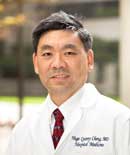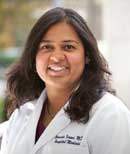Perioperative Medicine Services

Quinn Cheng, MD
Medical Director of Perioperative Medicine Services

Manisha Israni-Jiang, MD
Assistant Medical Director of Perioperative Medicine Services
The Division of Hospital Medicine works closely with other surgical specialties through our various perioperative medicine services. These include the Medicine Consult Service, the Co-Management with Neurosurgery Service, and the Mission Bay Hospitalist Service.
Medicine Consultation Service
The Medicine Consultation Service (MCS) at Moffitt-Long Hospital evaluates and manages acute and chronic medical problems in patients hospitalized on UCSF's surgical services. The hospitalist triages requests for inter-service transfers to the hospital medicine service. This is a direct-care service, but a resident rotating on a medicine consult elective is sometimes present. The MCS hospitalist also attends on a small service of non-acute medicine patient who must remain hospitalized due to complex psycho-social barriers to discharge. The hospitalist works with a dedicated case management and social work team to manage these patients.
Co-Management with Neurosurgery Service
The Co-Management with Neurosurgery Service (CNS) manages acute and chronic medical problems and performs urgent preoperative medical evaluation in patients hospitalized on the adult Neurological Surgery Service. Going beyond the role of a traditional consultant, the hospitalist on this direct-care service is an integral and vital component of their care team who has a broad scope of practice to manage medical issues. The hospitalist can consult on patients and write orders without obtaining permission from the neurosurgeons. To ensure that these patients receive the highest quality and safest care, the CNS hospitalists communicate and coordinate their efforts with a multidisciplinary team of physicians, advanced practice providers, and pharmacists.
Mission Bay Hospitalist Service
UCSF Medical Center at Mission Bay is a women’s and children’s hospital as well as a center for surgical treatment for cancer. There isn’t a primary medicine service at Mission Bay. Rather, the hospitalist's role is primarily that of a medical consultant, providing direct care for adult patients at the Mission Bay campus. The hospitalist facilitates consultation by medical specialists when needed, assists the (pediatric) Emergency Department with adult patients, and responds to Code Blue calls & assist the Rapid Response Team in evaluating unstable patients in the hospital and adjoining outpatient areas. The hospitalist also triages requests from outside facilities to transfer patients to our hospital medicine service.
Questions about the Perioperative Medicine Services can be directed to Quinny Cheng at [email protected]. or Manisha Israni-Jiang at [email protected].
